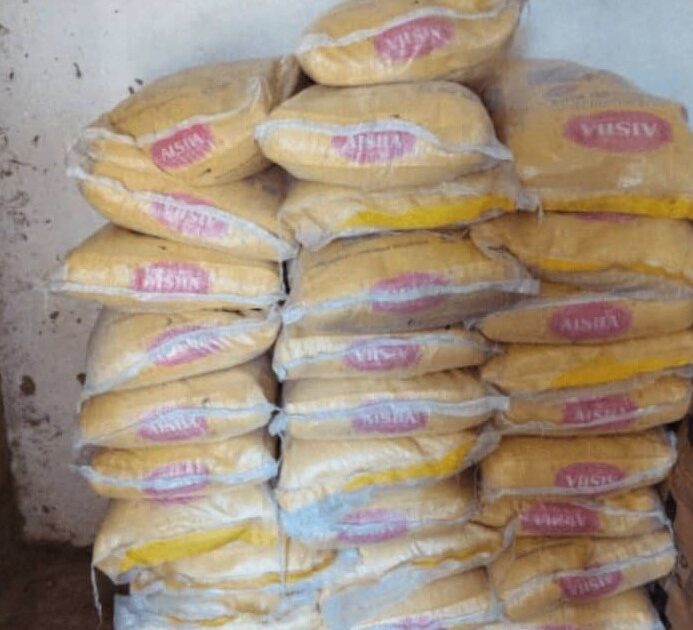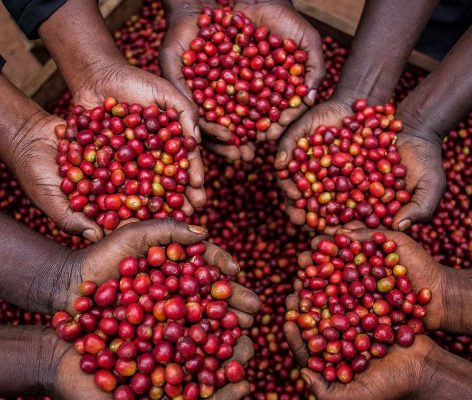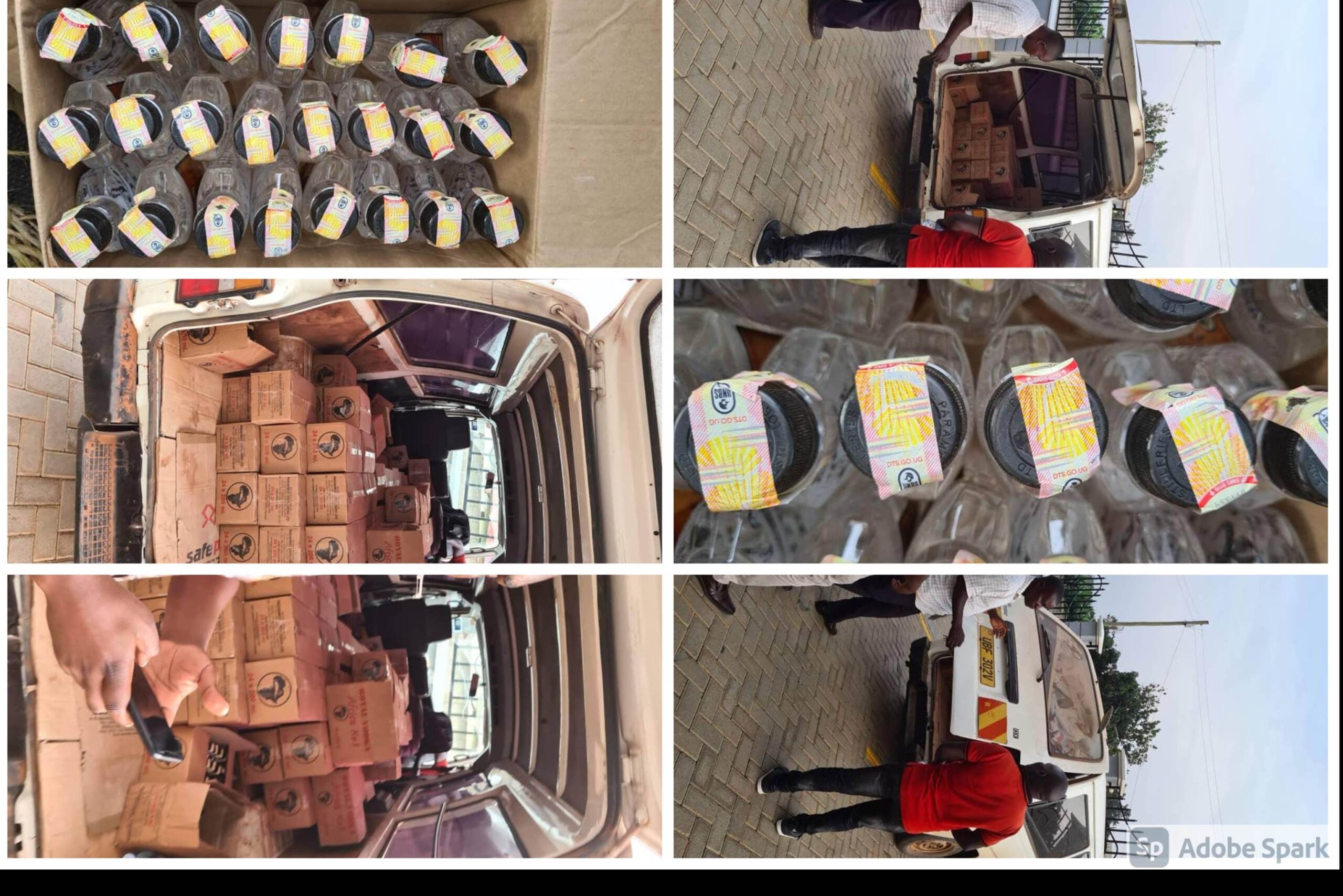The impounded Smuggled Rice
Uganda Revenue Authority (URA) joined other government agencies in a new initiative to fight cross-border crime, amidst increasing cases of smuggling. Over the last week, the agency’s border and enforcement personnel have netted various items from suspected smugglers through the eastern, western, and southern routes.
At Mutukula, URA reports that a group of “repetitive offenders” were attempting to drive their smuggled goods into Kampala from Tanzania when they were netted. “Their consolidation stores were busted in a very tight operation that involved the area Chairperson and Police that forced open their stores. Here, they had continuously piled their smuggled goods,” says URA.
Speaking on the goods that were intercepted, Moses Ankunda a Customs Officer in the southern region said that they recovered assorted items including 132 cartons of Santa Lucia spaghetti, 338 cartons of Afro care petroleum jelly, and 56 cartons of Azam wheat flour.
“We hired a truck as goods couldn’t fit on our enforcement pickup and finally made it to our station warehouse to commence on offense management process,” Ankunda said. URA also landed on contraband cosmetics that had already found their way into the country.
The customs team in Fort Portal was led to an identified store in which they discovered a smuggled consignment reportedly from the Democratic Republic of Congo, DRC, consisting of 85 cartons of assorted cosmetics. “At the store, we found stay-at-home mothers sheltered in the neighboring rooms pretending not to know what happens in the area. We carried out a search and found that one of the rooms had smuggled goods,” said Robert Isabirye, a customs officer in Fort Portal.
These cosmetics were not only evading taxes but included the types that are prohibited in Uganda.
Godson Mwesigye, the Manager of Enforcement Operations explained that despite the tight intelligence network to curb the importation of such products, smugglers still find their way to return them. “They declare them as products in transit to the neighboring countries like South Sudan and DR Congo where they are not prohibited, so once they get there they now organise and bring them back in small quantities using trucks,” Mwesigye explained.
In 2016, the government, through the Uganda National Bureau of Standards (UNBS) banned the importation of and trade in body products that contain mercury and hydroquinone, substances said to cause cancer in humans. The ban was reiterated in 2021 with UNBS saying that the products violate the Uganda standards US EAS 377-1:2013, yet 31 percent of the cosmetics on the market fall into this category, according to the standards agency.
Mwesigye added that smuggling of illegal cosmetics is common in the areas around Lake Albert, Mpondwe, Hoima, Congo, Bunagana, and Butogota. He therefore urged the public to desist from importing or consuming such harmful products as stipulated in the East African Community Customs Management Act (EACCMA). The Act prescribes a penalty of 50 percent of the value of goods or imprisonment for a term not exceeding five years or both on conviction.
Offenders are also liable to a fine not exceeding seven thousand dollars and their goods forfeited. Ibrahim Bbossa, the URA Spokesperson noted that continuous importation of such products not only affects the health of Ugandans but also affects the taxes URA collects for improved service delivery. “There are bad practices we have come across as a revenue mobiliser where people are engaging in illicit trade and contraband products. These products do not pay taxes and it is incumbent on us as a revenue mobiliser to work with other government agencies to take action,” Bbossa affirmed.
Over the same period on Thursday, the Jinja enforcement team intercepted truck number UBN075J which was conveying Pakistan-re-bagged rice. The team received intelligence of a truck that was headed to Kampala with Pakistan rice disguised as local. “The local rice was placed on top in branded bags of Kaka while the Pakistan rice was concealed under,” Philip Ofubo, a Customs Officer at the Jinja office narrated.
Upon verification, a total of 520 bags each having 25 kilograms were discovered, with half of them packed with rice from Pakistan and the rest with local rice. Currently, offence management is underway to ensure culprits are penalised. In another incident in the senregion, a van was impounded approaching Kampala with contraband laptops and other items, after the smugglers switched vehicles in Jinja to evade surveillance teams.
In Jinja, the only tactic the team applied was to change a vehicle. This gave comfort to the smugglers not to use porous routes but rather the main road through Isimba bridge to Kampala,” URA officials say. They were caught but later managed to flee leaving their vehicle, a Toyota Super Custom, registration number UBC149B, which was fully loaded with the contraband laptops.
Other items on the van included 334 pieces of used laptops, one piece of a new drone, eight pieces of desktop computers, 71 pieces of used iPhone and Samsung phones, assorted medicines and supplements, and seven packages of pure white Lucky grain sugar. Since interception, no one has come to claim the goods yet.
In another incident, the customs team in Jinja intercepted a Mitsubishi Canter truck, registration number UBH257J, which had been loaded with smuggled goods to Kampala. After a tip-off, “Our team swung into action fearing possible offloading before crossing the Nile bridge. We intercepted the car and escorted it to our base,” said Philip Ofubo.
At the station, during verification, 3.5 tonnes of rice, eight cartons of engine oil, and 10 pieces of new Ling Long tyres were discovered concealed in the garbage. According to Godson Mwesigye, the Manager of Enforcement Operations, the smugglers are killing Uganda’s economy by not paying the rightful taxes and are also frustrating the goal of the government to supply services needed for the population.
In the east, rice was one of the most smuggled items, according to the URA teams, with six vehicles impounded in a week. According to Ofubo, the other vehicles impounded with uncustomized rice were a Toyota Wish UBK101R, a minibus (taxi) UAW376M, a Toyota Nadia UAX491M, a Toyota Corona UAK643T, and a customized cement truck UBK422R.
Ofubo said the six vehicles were carrying 10 tons of smuggled rice in total. “During the focused operation, we got 407 bags of rice concealed in various ways. The brands are Sana, Muhamood, Baraf, and Hilal,” he said. He explained that they relied on intelligence from informants about rice being smuggled into the country.
“One of the vehicles, a cement truck, had bags purported to be carrying oranges, but our informant was spot on, and upon opening, we recovered 26 bags of rice, while a FUSO truck had 260 bags of re-bagged rice from Pakistan,” Ofubo remarked. Rice produced within the EAC carries zero percent import tax, z while that from other regions is taxed 75 percent under the Common External Tariff regime of the EAC.
Last month, URA acquired a machine to conduct tests and ascertain the origin of imported rice. The machine was provided by the National Agricultural Research Organization (NARO). Last week a Memorandum of Understanding was signed in Kampala to strengthen institutional collaboration and constitute a multi-agency working group to tackle economic crime challenges like tax evasion, money laundering, illicit financial flows, and cyber threats, among others.
The agencies include the Financial Intelligence Authority, the State House Anti-Corruption Unit, the Bank of Uganda, the Uganda Communications Commission, the External Security Organization, and the Internal Security Organization. Others are the Directorate of Public Prosecution, Chieftaincy of Military Intelligence, Uganda Peoples’ Defence Forces, Directorate of Immigration, the Crimes Intelligence, Uganda Prisons, and Uganda Wildlife Authority.
-URN





